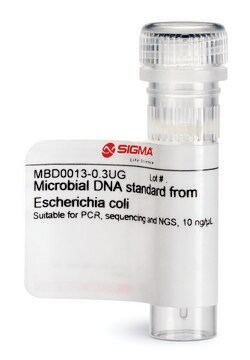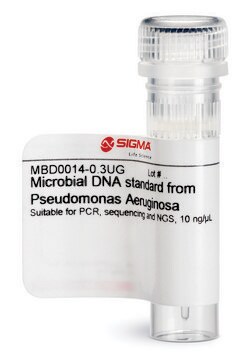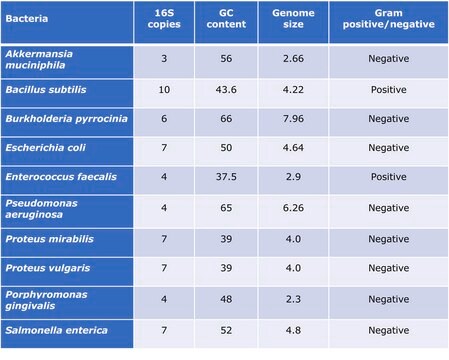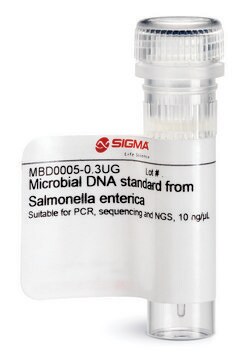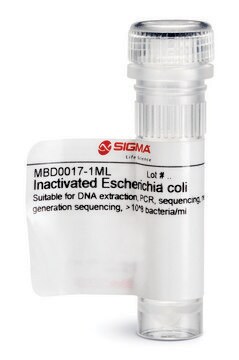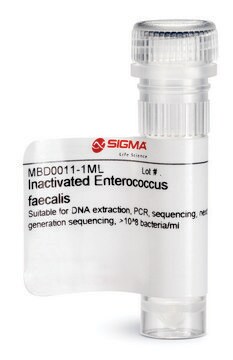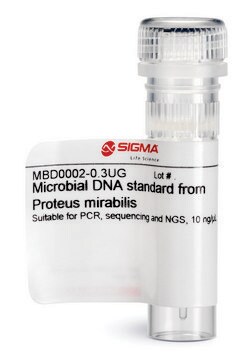MBD0012
Microbial DNA standard from Enterococcus faecalis
Suitable for PCR, sequencing and NGS, 10 ng/μL
Sign Into View Organizational & Contract Pricing
All Photos(2)
About This Item
UNSPSC Code:
41105500
NACRES:
NA.24
Recommended Products
Quality Level
form
liquid
concentration
10 ng/μL
technique(s)
DNA extraction: suitable
DNA sequencing: suitable
PCR: suitable
shipped in
ambient
storage temp.
−20°C
General description
Standardization of sample analysis is currently needed in microbiome genomics research workflow. Lack of standardization can lead to biases and errors in common processes during sample preparation and analysis such as sample amplification, sequencing and bioinformatics analyses. Enterococcus faecalis genomic DNA microbial standard can serve as standard for benchmarking the performance along the workflow of microbiomics or meta-genomics analyses and as a tool to increase reproducibility and allow comparison of results obtained by different labs. Enterococcus faecalis is a gram positive, facultative anaerobic, non-motile, coci-shaped bacterium. It is a commensal bacterium of the human intestine and a major opportunistic pathogen in immunocompromised and elderly patients. The pathogenesis of E. faecalis infection relies in part on its capacity to colonize the gut. Following disruption of intestinal homeostasis, E. faecalis can overgrow, cross the intestinal barrier, and enter the lymph and bloodstream. Isolates of E. faecalis that have ended up in strain collections, mainly from clinical infection sources, appear to have acquired resistance to tetracycline and chloramphenicol in the 1950s and 1960s, followed by gentamicin and erythromycin resistance in the 1970s, then ampicillin and vancomycin resistance in the 1980s and 1990s.
Read here how to use our standards to ensure data integrity for your microbiome research.
Read here how to use our standards to ensure data integrity for your microbiome research.
Application
The genomic DNA is provided at >=10 ng/μL concentration in TE buffer pH 8.0. It is recommended to avoid freeze thaw cycles of this product.
Suitable for Quantitative standard for PCR, Sequencing and NGS
Suitable for Quantitative standard for PCR, Sequencing and NGS
Features and Benefits
- Individual microbial standard for microbiomics and meta-genomics workflow
- Suitable standard for PCR, sequencing and NGS
- Improve Bioinformatics analyses
- Increases reproducibility
- Compare results lab to lab
Physical form
Liquid -The genomic DNA is provided at >=10 ng/μL concentration in TE buffer pH 8.0
Storage Class Code
12 - Non Combustible Liquids
WGK
WGK 1
Flash Point(F)
Not applicable
Flash Point(C)
Not applicable
Certificates of Analysis (COA)
Search for Certificates of Analysis (COA) by entering the products Lot/Batch Number. Lot and Batch Numbers can be found on a product’s label following the words ‘Lot’ or ‘Batch’.
Already Own This Product?
Find documentation for the products that you have recently purchased in the Document Library.
Daria Van Tyne et al.
Annual review of microbiology, 68, 337-356 (2014-07-09)
The enterococci are an ancient genus that evolved along with the tree of life. These intrinsically rugged bacteria are highly adapted members of the intestinal consortia of a range of hosts that spans the animal kingdom. Enterococci are also leading
B E Murray
Clinical microbiology reviews, 3(1), 46-65 (1990-01-01)
Enterococci are important human pathogens that are increasingly resistant to antimicrobial agents. These organisms were previously considered part of the genus Streptococcus but have recently been reclassified into their own genus, called Enterococcus. To date, 12 species pathogenic for humans
J Paul Brooks et al.
BMC microbiology, 15, 66-66 (2015-04-17)
Characterizing microbial communities via next-generation sequencing is subject to a number of pitfalls involving sample processing. The observed community composition can be a severe distortion of the quantities of bacteria actually present in the microbiome, hampering analysis and threatening the
Lionel Rigottier-Gois et al.
The Journal of infectious diseases, 211(1), 62-71 (2014-07-19)
Enterococcus faecalis is a commensal bacterium of the human intestine and a major opportunistic pathogen in immunocompromised and elderly patients. The pathogenesis of E. faecalis infection relies in part on its capacity to colonize the gut. Following disruption of intestinal
Our team of scientists has experience in all areas of research including Life Science, Material Science, Chemical Synthesis, Chromatography, Analytical and many others.
Contact Technical Service